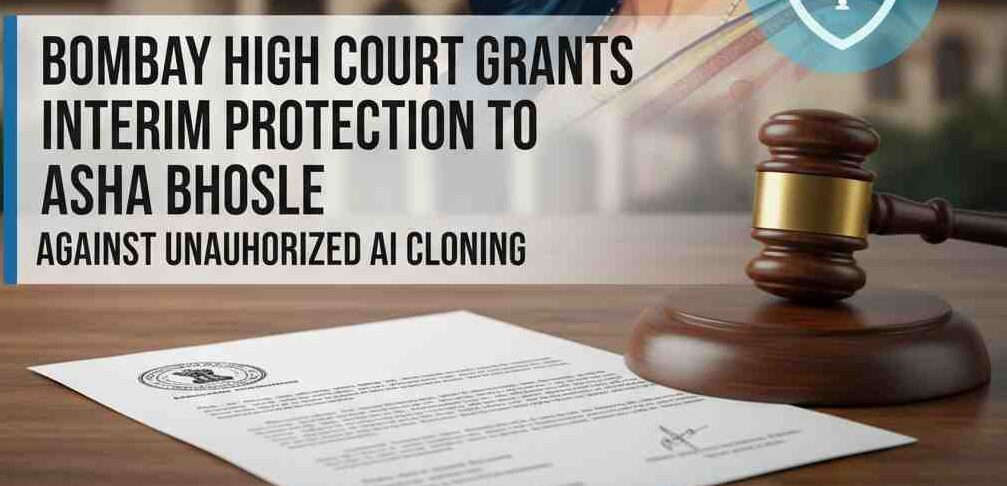The Bombay High Court grants interim relief to playback singer Asha Bhosle, restraining AI platforms and online sellers from using her voice and image without consent. The landmark decision reinforces celebrity personality rights in India amid rising AI-based impersonation threats
Background of the Case
In 2025, legendary Indian playback singer Asha Bhosle approached the Bombay High Court seeking immediate protection from unauthorized use of her voice and likeness through AI technology. Her plea was prompted by the emergence of AI platforms that created synthetic versions of her voice, as well as digital content featuring her image, without her consent.
The petition named several defendants, including AI-based content providers and online marketplaces, claiming that these entities facilitated the sale and distribution of AI-generated material, exploiting her identity. Bhosle argued that such activities violated her personality rights, a legal concept recognizing an individual’s control over the commercial use of their name, image, and voice.
Court’s Ruling
The Bombay High Court, presided over by Justice Arif S. Doctor, granted interim relief in favor of Asha Bhosle. The key observations of the court included:
- Unauthorized AI Cloning Violates Personality Rights:
The court emphasized that using a celebrity’s voice or image without permission constitutes a violation of their personality rights. The judgment highlighted that such misuse can harm the celebrity’s reputation and diminish their control over their public persona. - Immediate Protection and Restrictions:
The court issued an interim order restraining the defendants from using Bhosle’s voice, image, or likeness in any AI-generated content. This includes prohibiting the creation, distribution, or sale of digital products that replicate her persona without authorization. - Responsibility of Online Platforms:
The judgment also directed online marketplaces to remove infringing content promptly. The ruling underscored the liability of platforms hosting AI-generated material, requiring them to ensure that such content does not violate the rights of public figures.
This decision marks a significant step in recognizing and enforcing digital personality rights in India, particularly in the context of rapidly advancing AI technologies.
Legal Implications
Recognition of Personality Rights in the Digital Era
This ruling reinforces that personality rights are enforceable in India, extending beyond traditional media into the digital sphere. It affirms that a celebrity’s voice, image, and likeness are valuable aspects of their identity that require legal protection against unauthorized commercial exploitation.
AI and Emerging Legal Challenges
As AI-generated content becomes increasingly accessible, this case establishes a precedent for addressing unauthorized AI cloning. It signals to AI developers and content creators that consent is required before using someone’s voice or likeness, particularly for commercial purposes.
Accountability of Digital Platforms
The court’s order clarifies that online platforms cannot remain passive hosts of infringing content. Marketplaces and AI service providers are now legally obligated to monitor and remove content that violates personality rights, establishing a framework for digital content accountability.
Frequently Asked Questions (FAQs)
What are personality rights?
Personality rights protect an individual’s control over the commercial use of their identity, including their name, voice, image, and likeness. Unauthorized use leads to legal action.
Why did Asha Bhosle seek legal protection?
Bhosle discovered that AI platforms and online sellers were creating synthetic versions of her voice and selling content featuring her likeness without consent, prompting the legal challenge
How does this affect AI companies and digital marketplaces?
AI developers and online sellers must ensure they have proper authorization before using someone’s voice or image. Platforms may be held liable for hosting infringing content.
Conclusion
The Bombay High Court’s interim protection for Asha Bhosle represents a landmark development in Indian law, highlighting the growing importance of personality rights amid technological advances in AI. This ruling ensures that celebrities retain control over their voice, image, and likeness, providing a strong legal precedent for future cases involving unauthorized digital replication.
As AI continues to evolve, this case underscores the intersection of technology, law, and individual rights, reinforcing the principle that innovation should respect personal and moral rights. Celebrities, content creators, and AI platforms must now navigate a legal landscape that balances creativity with consent and accountability.

























